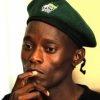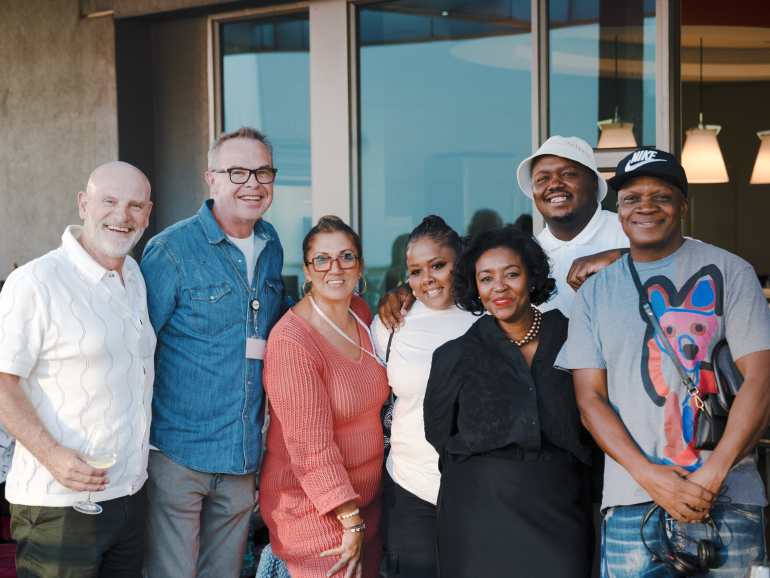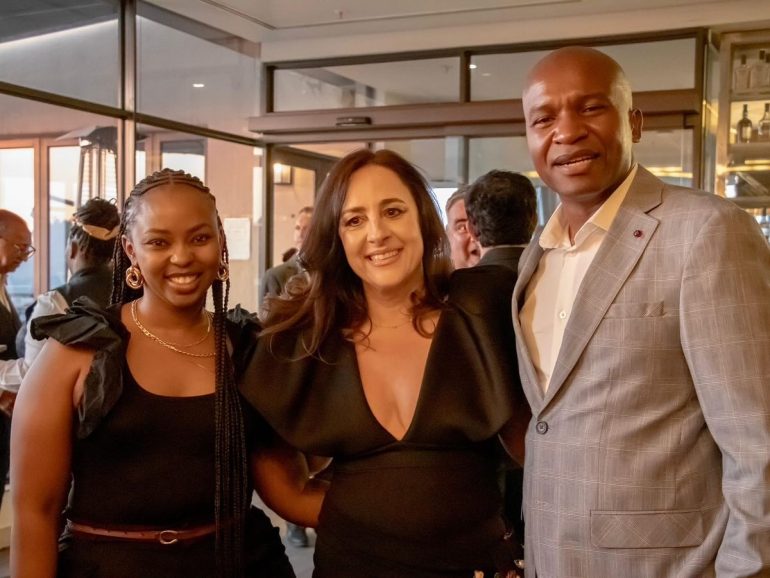- home Home
- keyboard_arrow_right PRESS OFFICE
- keyboard_arrow_right Posts
- keyboard_arrow_rightAn Excerpt from “The Land is Ours” by Tembeka Ngcukaitobi
An Excerpt from “The Land is Ours” by Tembeka Ngcukaitobi
‘A man of wig and gown’
On 2 October 1910, a steamer from England arrived on South African shores. Among those on board was Pixley ka Isaka Seme. There was a sense of elation upon disembarking, and also expectation. Since leaving for America thirteen years before, Seme had become an accomplished gentleman. Fluent in English, he was fully conversant in Dutch and French, played the piano, and enjoyed a game of snooker or tennis. He also held a BA degree from a prestigious Ivy League university. And though he had not completed his BCL at Oxford, he had qualified as a barrister. By now, Seme was a man of the world, having lived in New York, Oxford and London, and visited Paris and Holland in 1909. His cosmopolitan outlook was formed by friendships and relationships he had developed in various parts of the world. Booker T. Washington was a mentor, and Seme counted Henry Sylvester Williams, the founder of Pan-Africanism, a friend. He could call upon Alfred Hazel, his former Oxford tutor, who was also at the heart of political action in the United Kingdom. Now, Seme’s priority was to qualify as a lawyer, the culmination of a career many years in the making.
On 13 January 1911, Seme opened legal offices on the corner of Joubert and Anderson Streets in Johannesburg. At the time, the only other black law firm in Johannesburg was that of Alfred Mangena, also in Anderson Street.38 Although Seme applied for admission as an attorney, he had hoped to practise as an advocate. This was not possible, however: unlike in the Cape, the profession of advocates in the Transvaal was reserved for persons of European descent. There is a clear undertone of annoyance in Seme’s January 1912 letter to his former benefactor, Reverend Pixley, where he lampoons the practices of the barrister – ‘a man of wig and gown’:
It will be an evil day for [the barrister] when he starts brief hunting though he may be starving for lack of golden guineas. On circuit the watchful eyes of etiquette are always on him. Even for the sake of company he must be a sociable man, he must not travel there by any class but the first. Even his professional dress is regulated for him to the extent that he must not appear in court in any other coat but one of sober black, nor must he show his face in court if he is carrying the blue bag which may be his familiar companion in street and train. Unless he is entitled to carry a red bag (and this he must not buy – it must be given to him by some friendly senior), he must be content to make his appearance with his briefs and papers under his arm.39
For all his lightheartedness, Seme was aware that he had a mission to fulfil. The land he had left behind nine years before was not the place he had returned to. The Union of South Africa had been established as a country under British dominion. Natal and the Cape were no longer colonies, but provinces of South Africa, as were the two former Boer republics, the Transvaal and the Orange Free State. A new, though shifting, South African identity had been thrust on his people. Some had embraced it. And others not.
It is remarkable that, in all the years he spent at Columbia, Oxford and Middle Temple, Seme never once referred to any experience of race discrimination. But in South Africa it was different. Some two years after his return, Seme the black attorney was forced to spend a night in a stable. Returning from a visit to Swaziland on 17 October 1912, despite being the only passenger to disembark from the train, he was refused accommodation at a hotel, which was for ‘Europeans only’. The African driver of a mail coach gave up the nearby stable for Seme to spend the night there, while the driver himself slept inside the coach – which had the misfortune of being robbed of £3 000 that very night. The distraught driver was discovered by the police in the morning, gagged and bound. Seme would encounter many such instances. Race continued to count against him, and not even his Ivy League and Oxford education spared him such indignities.
In the new political dispensation, Dube expected that Seme would ‘find it convenient to stay in Natal to work in the new field of government’s efforts for leading the native people to the new ideas of life that are to largely aid in consolidating the whole interests of the Union’. But Seme had a much grander vision: he would reject tribalism, ethnicity and provincialism in favour of a broad nationalism. He urgently needed to work towards a national political organisation, as envisaged by Jabavu.
The role of Seme in the history and formation of the ANC is a highly contested topic. As early as 1929, S.E.K. Mqhayi repudiated claims by Richard Victor Selope Thema, then secretary of the ANC, that Seme had founded the ANC:
This gentleman says this assembly was founded by Dr Seme in 1912. It is on precisely this point that I wish to enlighten this young man so that he sees his way clearly, because what he is focusing on is a worthy story indeed. As an old man I would like to take him back to the year 1887, the year of Thung’Umlomo, Stitch the Mouth. In that year there was an effort here in the Cape to establish a major association with Mr Goda Sishuba in the chair and Mr J.T. Jabavu as secretary – but after a while, Mr Thomas Mqanda became chairman and Mr Jonathan Tunyiswa secretary. That association was named the SA Native Congress (Ingqungquthela).40
There are certain indisputable facts concerning the circumstances which led to the formation of the ANC. The South African Native Congress was already in existence by 1890. Between 1908 and 1910, the South African Native Convention existed, and its deputation went to Britain in 1909. Ironically, the seeds for a national organisation were first planted not by those who eventually became leaders of the ANC, but by Jabavu, who was opposed to the formation of its forerunner, the SANNC. Jabavu envisaged a new national organisation founded along non-racial lines. Echoing Jabavu, on 24 October 1911 Seme published an article
in Imvo Zabantsundu in which he announced that ‘several natives, leaders and chiefs’ had asked him to ‘write a full and concise statement on the subject of the South African Native Congress’.41
In the article, Seme argued that societal progress could only be achieved by cooperation ‘among all races’. He believed that people ‘everywhere in the world’ bear mutual obligations to God and ‘towards one another’. The implication was that people everywhere had a moral duty to the oppressed people of South Africa; this was Seme’s unique contribution to the debate, and to the character of the new organisation. It was also a manifestation of Seme’s internationalism and universalism, which he sought to infuse into the nascent organisation. The greatest success, he added, would come when ‘man shall have learned to cooperate, not only with his own kith and kin but all peoples and with all life’. From the outset, the SANNC would not be limited by borders, and would cooperate with all the peoples of the world. Only thus could it achieve meaningful progress. The character of the organisation should be anti-tribal and non-racial, Seme urged:
The demon of racialism, the aberrations of the Xosa-Fingo feud, the animosity that exists between the Zulus and the Tongas, between the Bantus and every other Native must be buried and forgotten; it has shed among us sufficient blood! We are one people. These divisions, these jealousies, are the cause of all our woes and of all our backwardness and ignorance today.
Seme’s use of the term ‘racialism’ and his subsequent references to inter-tribal ‘aberrations’ and ‘animosities’ is intriguing. It is likely that he wished to distinguish racialism from inter-tribal conflicts. In his Columbia speech of 1906, Seme had used the term ‘race’ in distinguishing between Africans and Europeans – the ‘African race’ and the ‘European race’. But ‘racialism’ was different – it was a demon that had caused too much bloodshed. The declaration that ‘we are one people’ is more significant than is generally acknowledged. First, it is a non-racial concept, which includes all South Africans, regardless of race. Second, it is a universal concept, rooted in a humanism which places at the centre ‘all peoples’ and ‘all life’. Peace and unity should be available to all who live in South Africa. As such, the new country, founded on the idea of non-racialism and non-tribalism, would be a home for all.
“The Land is Ours” is published by Penguin Random House South Africa
To stand a chance of winning one of eight “The Land is Ours” copies enter here.
Written by: Kayafm Digital
Book Excerpt Kaya Book Club Land Tembeka Ngcukaitobi The Land is Ours
Similar posts
MORE ARTICLES

ANC Youth League demands justice for Sindiso Magaqa beyond hitman’s conviction

Liverpool FC vows to pay out Diogo Jota’s R350 million contract to his widow

The World Show with Nicky B broadcasts live from France

Sindiso Magaqa assassin handed an 85-year sentence

Skhumba, Kgomotso and Glen weigh in on reincarnation
QUICK LINKS
UpComing Shows

The Best T in the City
With T Bose
He has held it down in the world of mid-morning radio with the best music, riveting topics, brilliant mixes and interesting guests. Every weekday, The Best T proves why he is the BEST by connecting to you like only your bro or favourite uncle could. He lets his listeners dictate the songs they want to hear in the ever-popular Top 10 at 10, and his Three Teaspoons never run out. Catch The Best T in the City Mondays to Fridays from 09h00 to 12h00.
close
Feel Good
With Andy Maqondwana
Feel good about feeling good! That's exactly what The Feel-Good show is about. An escape from the negativity that surrounds us, indulging you in good feels. Pass it on to one and all. Spread the good feeling around Gauteng with Andy Maqondwana.
close
Kaya Biz
With Gugulethu Mfuphi
The world of business is simplified for you by Kaya Biz with Gugulethu Mfuphi. This fast-paced award-winning business show talks to the corporate giants as well as up and coming entrepreneurs about their wins and challenges. Gugulethu invites guests to offer their analyses of markets and economies, and also delves into issues of personal financial wellness. Kaya Biz airs Mondays to Thursdays 18h00 to 19h00.
close
Point of View
With Phemelo Motene
Point of View with Phemelo Motene delves into the day’s current affairs, touches on real issues that affect people’s daily lives and shares expert advice on questions posed by the audience. Mondays to Thursdays 20:00 to 22:00.
closeConnect with Kaya 959
DownLoad Our Mobile App
© 2025 Kaya 959 | On The Street On The Air











